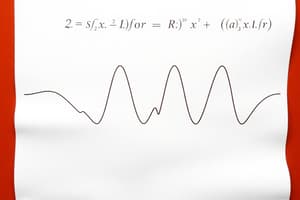Podcast
Questions and Answers
The series $1 + \frac{1}{2} + \frac{1}{3} + \ldots + \frac{1}{n}$ converges to 1.
The series $1 + \frac{1}{2} + \frac{1}{3} + \ldots + \frac{1}{n}$ converges to 1.
False (B)
The limit of $s_n$ as $n$ approaches infinity is 1.
The limit of $s_n$ as $n$ approaches infinity is 1.
True (A)
$s_2 = 1 + \frac{1}{2}$ and $s_4 = 1 + \frac{1}{2} + \frac{1}{4}$.
$s_2 = 1 + \frac{1}{2}$ and $s_4 = 1 + \frac{1}{2} + \frac{1}{4}$.
False (B)
$s_{22} = 1 + 2\left(\frac{1}{4}\right)$.
$s_{22} = 1 + 2\left(\frac{1}{4}\right)$.
$s_{23} = 1 + \frac{1}{2} + \frac{1}{3} + \ldots + \frac{1}{8}$.
$s_{23} = 1 + \frac{1}{2} + \frac{1}{3} + \ldots + \frac{1}{8}$.
$s_{23} > s_8$.
$s_{23} > s_8$.
$s_{2n} > 1 + n\left(\frac{1}{2}\right)$.
$s_{2n} > 1 + n\left(\frac{1}{2}\right)$.
$\lim_{n\to\infty}s_{2n} = 1$.
$\lim_{n\to\infty}s_{2n} = 1$.
$\lim_{n\to\infty}s_2n > \lim_{n\to\infty}s_n$.
$\lim_{n\to\infty}s_2n > \lim_{n\to\infty}s_n$.
The series described in the text is bounded above.
The series described in the text is bounded above.
Flashcards are hidden until you start studying




